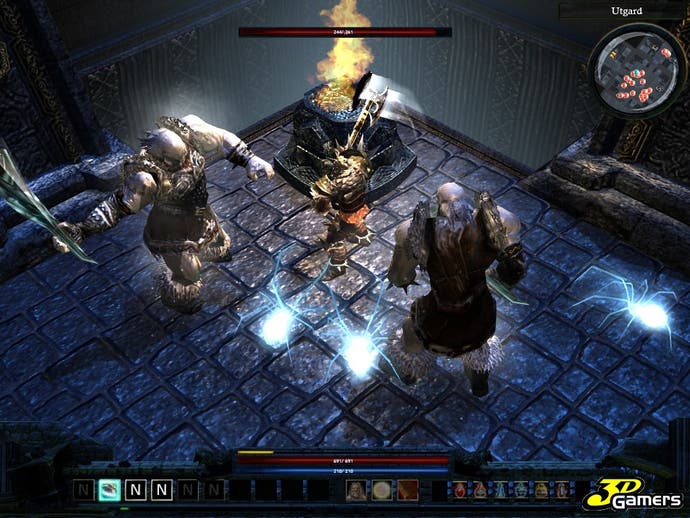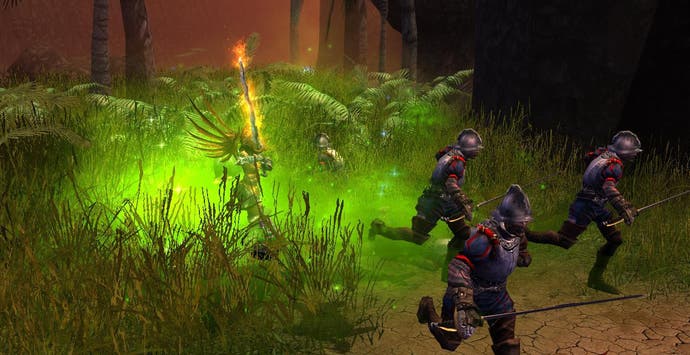Loki
Not the Lie-Smith's greatest trick.
When we previewed French developer Cyanide's action RPG title Loki at the start of last month, our conclusion was that the game was shaping up to be pretty enjoyable and entertaining, without actually contributing anything new or particularly interesting to the action RPG genre.
We used words like "solid" and "competent", which is a bit of a shame; in retrospect, we'd prefer to have saved such phrases for this review. Perhaps we'd qualify them a little, though. Loki is fairly solid. It's quite competent.
Yes, we know - we're fairly heavily damning the game with faint praise at this point. However, that's the thing about Loki; having now played through the review version of the game, we find ourselves not really disliking a great deal about the game.
We can't complain that the graphics are ugly; they're not, they're perfectly passable for a game of this type. The combat system isn't intrinsically broken in any way; there's a vaguely irritating lag between pressing the button and executing the action, but nothing worth writing to your MP about. The equipment system is okay, we suppose. The quests are fairly reasonable.

The problem, as you may have gathered, is that there's not a lot to actually like about Loki. Our primary fear, when we previewed the game, was that its shameless aping of previous games in the genre would overpower the general competence of its execution. This is indeed the case; and the results are deeply, deeply, almost crushingly average.
To recap briefly, the fundamental idea behind Loki is that you play as either a Norse, Greek, Egyptian or Aztec warrior (two female classes, two male; two melee, two magical), and assist the four Pantheons of the Gods with sorting out the Egyptian god Seth, who is hatching an Evil Plot.
Unfortunately, the hugely promising mythology of the title is let down by storytelling so thin as to be almost transparent. You fight your way through the four different ancient areas (which you can do in any order you like - enemies level up alongside you so the order makes little difference) carrying out various terribly uninspired quests and exploring near-endless random dungeons, whose random nature can't disguise the fact that they all basically look the same.
The game is, at heart, a clone of Diablo 2, and it blatantly copies just about every feature the genre has seen thus far - without actually adding anything of its own to the mix, or even combining pre-existing features in an interesting new way.

A perfect example is the armour system, which initially looked fascinating due to the ability to reforge pieces of armour with new materials, thus changing your resistance to a wide variety of elemental and status effects. However, this system is far less interesting in practise than in theory, due to the somewhat botched job Cyanide has made of resistances in general. Having added a bewildering array of elements and status effects, the developer then clearly realised it was all too complex, and made it possible to increase swathes of resistances all at once. The net effect is to create a system that looks over-complicated, but is actually simple to the point of being uninteresting - the worst of both worlds.
In Loki's defence, Cyanide has managed to get one key aspect of the game very right; its online co-op and battle modes are well considered and boast solid cheat protection, which will appeal to those who like playing these games with strangers online. Beyond that, however, Loki's downright mediocrity starts to grate very quickly - and we are simply reminded time and time again of far more interesting, innovative games in the same genre, such as the legendary Diablo 2 or the more recent Titan Quest.
There's much to be said for games which simply polish an existing formula to a shine - but Loki, sadly, doesn't even quite accomplish that. It's solid, and it's competent, but unless you're absolutely crazy for point and click action RPGs, we find it hard to recommend a game on the basis of competence alone.

